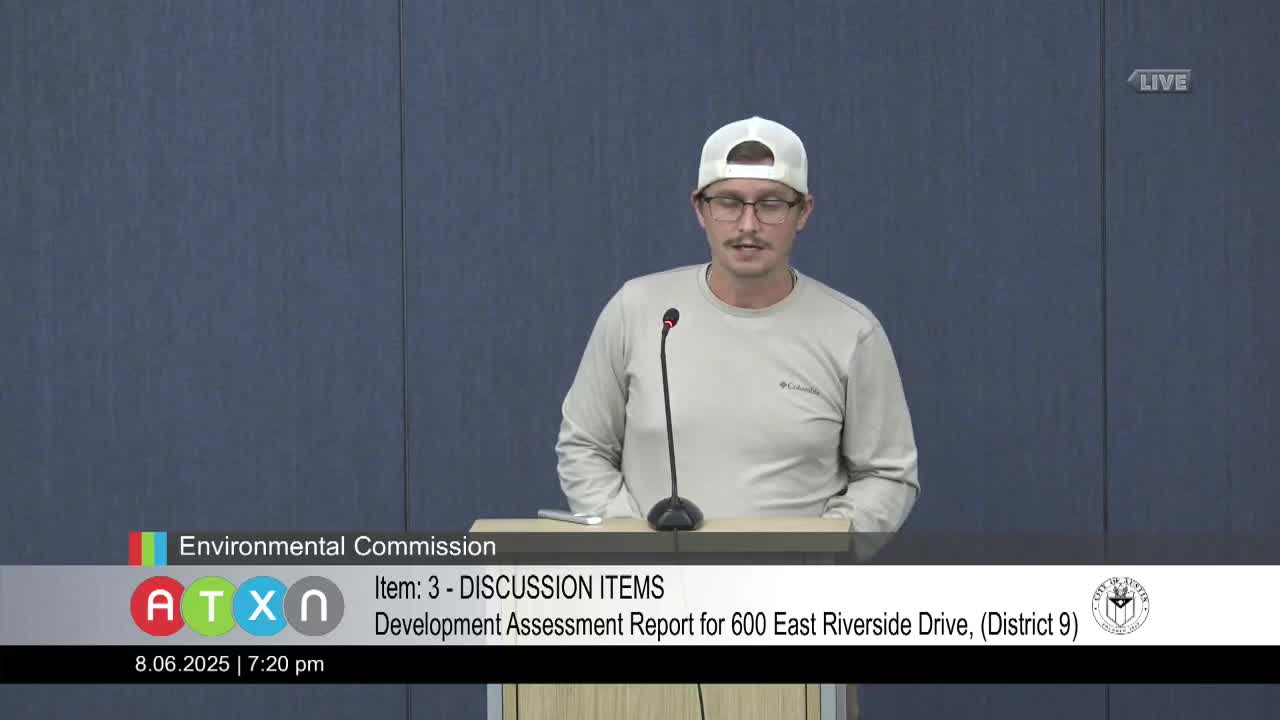Community Fights Proposed Developments on Lady Bird Lake Waterfront
August 06, 2025 | Austin, Travis County, Texas
This article was created by AI summarizing key points discussed. AI makes mistakes, so for full details and context, please refer to the video of the full meeting. Please report any errors so we can fix them. Report an error »

During a recent meeting of the Austin Environmental Commission, significant concerns were raised regarding proposed developments along Lady Bird Lake, highlighting the ongoing tension between urban growth and environmental preservation. The discussions centered on a series of proposed changes that could potentially compromise the ecological integrity of the lakefront, which has long been protected from extensive development.
Commission members expressed strong opposition to plans that would allow automotive sales and other commercial activities directly on the lakefront. Critics argued that such developments are incompatible with the area’s environmental goals, particularly given the sensitive nature of nearby wetlands and water quality zones. The proposal includes increasing impervious cover—areas that do not absorb rainwater—within critical zones, which could lead to increased pollution runoff into the lake.
Key points of contention included requests to exempt developers from requirements aimed at protecting the environment, such as maintaining bird-friendly glass in buildings and preserving natural shorelines. The commission emphasized the importance of adhering to existing environmental regulations and community plans designed to safeguard the lake’s ecosystem.
Additionally, concerns were raised about the potential for increased building heights and the construction of large docks, which could further encroach on the natural landscape and disrupt local wildlife habitats. The commission underscored the need for a more thoughtful approach to development that aligns with the community’s long-term environmental objectives.
As the meeting concluded, members reiterated their commitment to protecting Lady Bird Lake and ensuring that any future developments respect the delicate balance between urbanization and environmental stewardship. The discussions reflect a broader community concern about maintaining Austin’s natural resources amid rapid growth, emphasizing the need for sustainable planning practices that prioritize ecological health.
Commission members expressed strong opposition to plans that would allow automotive sales and other commercial activities directly on the lakefront. Critics argued that such developments are incompatible with the area’s environmental goals, particularly given the sensitive nature of nearby wetlands and water quality zones. The proposal includes increasing impervious cover—areas that do not absorb rainwater—within critical zones, which could lead to increased pollution runoff into the lake.
Key points of contention included requests to exempt developers from requirements aimed at protecting the environment, such as maintaining bird-friendly glass in buildings and preserving natural shorelines. The commission emphasized the importance of adhering to existing environmental regulations and community plans designed to safeguard the lake’s ecosystem.
Additionally, concerns were raised about the potential for increased building heights and the construction of large docks, which could further encroach on the natural landscape and disrupt local wildlife habitats. The commission underscored the need for a more thoughtful approach to development that aligns with the community’s long-term environmental objectives.
As the meeting concluded, members reiterated their commitment to protecting Lady Bird Lake and ensuring that any future developments respect the delicate balance between urbanization and environmental stewardship. The discussions reflect a broader community concern about maintaining Austin’s natural resources amid rapid growth, emphasizing the need for sustainable planning practices that prioritize ecological health.
View full meeting
This article is based on a recent meeting—watch the full video and explore the complete transcript for deeper insights into the discussion.
View full meeting
